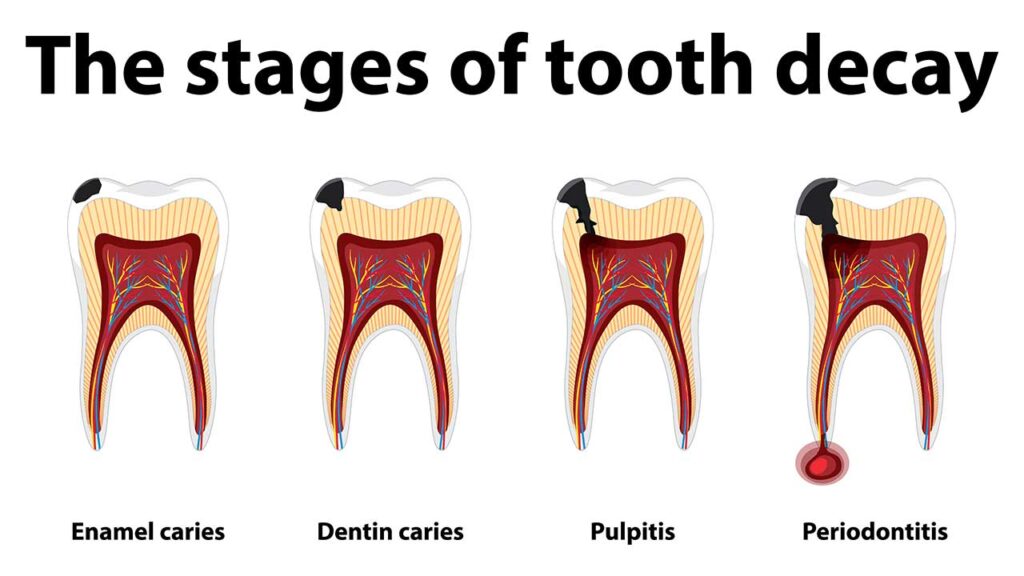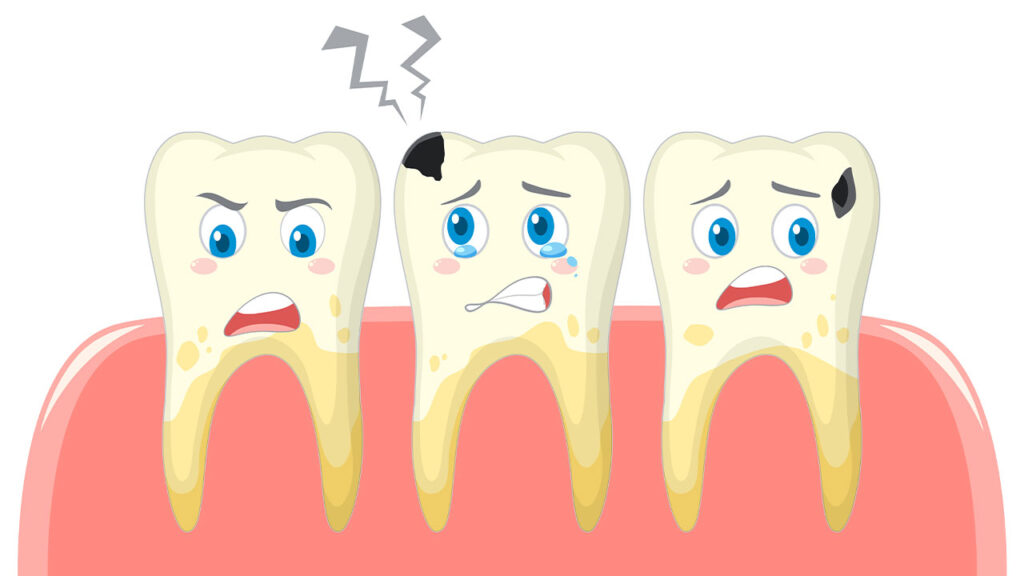Maintaining good oral health is essential for overall health and well-being. Dental hygiene plays a crucial role in preventing tooth decay, a common and painful condition that can impact the quality of life. In this article, we will discuss the importance of dental hygiene in preventing tooth decay, the anatomy of a tooth, the connection between dental hygiene and tooth decay, and best practices for maintaining good oral health.
Importance of dental hygiene in maintaining oral health:
Good oral hygiene is essential in preventing tooth decay and maintaining a healthy mouth. Regular brushing, flossing, and dental check-ups are all important factors in preventing tooth decay and promoting oral health. When combined with a healthy diet and lifestyle, good dental hygiene can help ensure that your teeth and gums remain healthy and pain-free.
The impact of tooth decay on overall health:
Tooth decay is a common condition that can lead to pain, infection, and even tooth loss. If left untreated, tooth decay can also spread to other parts of the mouth and lead to more serious health problems. In addition to causing pain and discomfort, tooth decay can also impact the quality of life, causing embarrassment and social anxiety.
Overview of the article:
In this article, we will discuss the definition and causes of tooth decay, the anatomy of a tooth and how decay forms, and the types of decay and common risk factors. We will also examine the connection between dental hygiene and tooth decay, including the role of brushing and flossing, the role of saliva in preventing decay, and the impact of diet and lifestyle on oral health. We will then explore the best practices for dental hygiene, including brushing techniques, flossing techniques, interdental cleaning tools and techniques, and the importance of regular dental cleanings. Finally, we will discuss the importance of prevention in maintaining good oral health, including maintaining a healthy diet and lifestyle, getting regular dental check-ups and cleanings, understanding and managing underlying medical conditions, and early intervention and treatment of tooth decay.
What is Tooth Decay?

A. Definition and causes:
Tooth decay is the destruction of the hard surface of a tooth (enamel) caused by bacteria that produce acid. This acid can dissolve the enamel and create a cavity, or hole, in the tooth. Tooth decay is a common condition that can be caused by several factors, including poor dental hygiene, a diet high in sugar and other carbohydrates, and a lack of fluoride in the water supply.
B. The anatomy of a tooth and how decay forms:
A tooth is composed of several different layers, including the enamel, dentin, and pulp. The enamel is the outermost layer and provides a protective covering for the tooth. When bacteria produce acid, they can dissolve the enamel, creating a cavity. Over time, the cavity can get larger and deeper, reaching the dentin and eventually the pulp of the tooth.
C. Types of decay and common risk factors:
There are several types of decay, including cavities, root decay, and gum line decay. The most common type of decay is cavities, which form when bacteria produce acid that dissolves the enamel. Common risk factors for tooth decay include poor dental hygiene, a diet high in sugar and other carbohydrates, and a lack of fluoride in the water supply. Other risk factors include medical conditions such as dry mouth, certain medications, and genetics.
The Connection between Dental Hygiene and Tooth Decay:
A. Brushing and flossing to remove plaque and bacteria:
Brushing and flossing are crucial in removing plaque and bacteria that can cause tooth decay. Brushing twice a day with fluoride toothpaste and flossing daily can help remove plaque from areas where a toothbrush cannot reach and prevent the build-up of harmful bacteria in the mouth.
B. The role of saliva in preventing decay:
Saliva helps neutralize acid and wash away food particles, helping to prevent the build-up of bacteria that can cause tooth decay. Maintaining good oral hydration, avoiding sugary and acidic foods, and avoiding tobacco and alcohol use can all help maintain a healthy flow of saliva and prevent tooth decay.
C. Impact of diet and lifestyle on oral health:
A diet high in sugar and carbohydrates can increase the risk of tooth decay by providing a source of fuel for harmful bacteria. A diet rich in fruits, vegetables, and dairy products, and low in sugar, can help maintain good oral health. In addition, avoiding tobacco and alcohol use, as well as managing underlying medical conditions, can all have a positive impact on oral health and prevent tooth decay.
Dental Hygiene Best Practices:
A. Brushing techniques:
Brushing twice a day with fluoride toothpaste, using circular motions and brushing for two minutes each time, can help remove plaque and prevent tooth decay.
B. Flossing techniques:
Flossing daily can help remove plaque and food particles from areas between the teeth where a toothbrush cannot reach. Gently insert the floss between the teeth, using a back-and-forth motion, and curve it around the tooth to remove plaque.
C. Interdental cleaning tools:
Interdental cleaning tools, such as interdental brushes and water flossers, can help remove plaque and food particles from areas between the teeth where a toothbrush and floss cannot reach.
D. Regular dental cleanings:
Regular dental cleanings and check-ups can help prevent tooth decay and maintain good oral health. A dental professional can remove plaque and tartar build-up, identify any early signs of decay, and provide preventive treatments, such as fluoride treatments and dental sealants, to help prevent tooth decay.
healthcareDental health is an important aspect of overall health and well-being. Take control of your dental health with our top-quality dental health care products. Say goodbye to painful and inconvenient dental issues and hello to a brighter, healthier smile.
These products are designed with the latest technology and are made from premium materials, ensuring that you get the best results. Whether you’re looking for a solution for sensitive teeth, gum health, or just want to keep your smile sparkling, our dental health care products have got you covered.
Tired of hiding your smile due to yellowing, stained, or sensitive teeth?
ProDentim is here to help. This advanced formula whitens and strengthens your teeth, while also reducing sensitivity and promoting oral health. Say goodbye to expensive and painful dental treatments, and start enjoying a bright, confident smile with ProDentim.
Click Here to Try ProDentim now and see the results for yourself!
Struggling with tooth sensitivity, gum problems or bad breath?
Dentitox Pro is the solution you need. This natural, effective formula helps to clean and strengthen your teeth and gums, giving you a brighter, healthier smile. Dentitox Pro is made with the finest ingredients and is free from harmful chemicals, making it safe and gentle for everyday use. Say goodbye to pain and embarrassment, and start enjoying a confident, beautiful smile with Dentitox Pro.
Click Here to Order now and get 20% off your first purchase!
Click Here for Professional Teeth Whitening
FAQ About the Role of Dental Hygiene in Preventing Tooth Decay
Q: What is the role of dental hygiene in preventing tooth decay?
A: Dental hygiene is essential in preventing tooth decay as it helps to remove plaque, a sticky film of bacteria that forms on teeth, which is the main cause of tooth decay and gum disease. Good dental hygiene practices, such as brushing twice a day with fluoride toothpaste, flossing daily, and rinsing with mouthwash, can help to prevent the build-up of plaque and protect against tooth decay.
Q: How often should I brush my teeth to prevent tooth decay?
A: It is recommended to brush your teeth at least twice a day, in the morning and before bed, to effectively remove plaque and prevent tooth decay. Brushing after every meal is even better, but at a minimum, brushing twice a day is essential for good dental hygiene.
Q: What type of toothbrush and toothpaste should I use to prevent tooth decay?
A: To prevent tooth decay, it is recommended to use a toothbrush with soft bristles and fluoride toothpaste. Fluoride helps to strengthen the enamel on your teeth, making them more resistant to decay. A toothbrush with soft bristles is gentler on your teeth and gums, reducing the risk of damage and irritation.
Q: Is flossing necessary for preventing tooth decay?
A: Yes, flossing is an important part of dental hygiene and is necessary for preventing tooth decay. Brushing alone can’t effectively remove plaque from between teeth and along the gum line, where tooth decay is often first detected. Flossing helps to remove plaque and food particles from these areas, reducing the risk of tooth decay.
Q: What other dental hygiene practices can help prevent tooth decay?
A: In addition to brushing, flossing, and rinsing with mouthwash, several other dental hygiene practices can help prevent tooth decay. These include:
Eating a healthy, balanced diet that is low in sugar and acid
Using dental products of fluoride, such as fluoride toothpaste and mouthwash
Visiting your dentist regularly for check-ups and professional cleanings
Wearing a mouthguard if you play sports or grind your teeth at night
Chewing sugar-free gum stimulates saliva production, which helps to neutralize plaque acids.
By following these simple dental hygiene practices, you can help to prevent tooth decay and maintain good oral health.
Dental hygiene is a crucial component in preventing tooth decay and maintaining good oral health. By practising good oral hygiene habits, such as brushing and flossing, maintaining a healthy diet and lifestyle, and getting regular dental check-ups, individuals can help prevent tooth decay and ensure healthy teeth and gums.


8 thoughts on “The Role of Dental Hygiene in Preventing Tooth Decay”